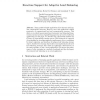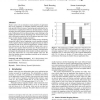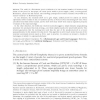8706 search results - page 1705 / 1742 » Learning Subjective Language |
150
click to vote
AGENTS
2001
Springer
15 years 7 months ago
2001
Springer
Agents are intended to interact in open systems where the knowledge about others (reputation) is incomplete and uncertain. Also, this knowledge about other agents is subjective si...
142
click to vote
IPPS
2000
IEEE
15 years 6 months ago
2000
IEEE
Abstract. Many parallel scienti c applications have dynamic and irregular computational structure. However, most such applications exhibit persistence of computational load and com...
119
Voted
SIGSOFT
2000
ACM
15 years 6 months ago
2000
ACM
Software systems should consist of simple, conceptually clean software components interacting along narrow, well-defined paths. All too often, this is not reality: complex compon...
107
click to vote
CGO
2010
IEEE
15 years 6 months ago
2010
IEEE
Shadow value tools use metadata to track properties of application data at the granularity of individual machine instructions. These tools provide effective means of monitoring an...
124
click to vote
STOC
1999
ACM
15 years 6 months ago
1999
ACM
The width of a Resolution proof is defined to be the maximal number of literals in any clause of the proof. In this paper, we relate proof width to proof length (ϭsize), in both g...



